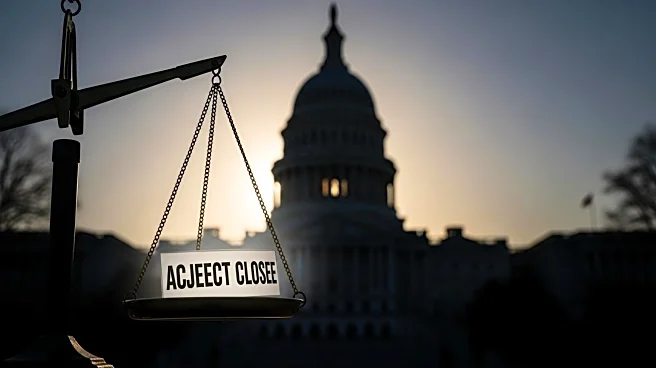What's Happening?
Senator Lindsey Graham of South Carolina has expressed his willingness to vote for reopening the federal government but remains firm in his refusal to negotiate with Senate Democrats on extending Affordable Care Act (ACA) subsidies while the government is shut down. Graham's stance comes as the government shutdown enters its 11th day, affecting hundreds of thousands of federal workers and critical services. The Senate is currently at an impasse over a temporary funding measure, with Democrats proposing a resolution to keep the government open until October 31, which includes reversing Medicaid cuts and extending ACA subsidies. Graham argues that negotiating subsidies during the shutdown is not feasible, referencing past shutdowns where similar tactics were employed without success.
Why It's Important?
The ongoing government shutdown has significant implications for federal employees and the general public, as essential services are disrupted. The debate over ACA subsidies is crucial, as millions of Americans rely on these subsidies for affordable healthcare. The refusal to negotiate on this issue could lead to increased healthcare costs for many, potentially making it unaffordable for those dependent on ACA. The political standoff highlights the broader challenges in reaching bipartisan agreements on healthcare and budgetary issues, affecting public policy and economic stability.
What's Next?
The Senate must find a resolution to the funding impasse to reopen the government and address the ACA subsidy issue. Democrats are pushing for immediate action to prevent healthcare costs from rising, while Republicans, led by Graham, are holding firm on their stance against negotiating under shutdown conditions. The situation requires both parties to engage in meaningful discussions to find a compromise that addresses healthcare affordability without prolonging the shutdown.
Beyond the Headlines
The shutdown and subsidy debate underscore the complexities of healthcare policy in the U.S., where political disagreements can directly impact citizens' access to affordable healthcare. The ethical considerations of using government shutdowns as leverage in policy negotiations raise questions about the prioritization of political agendas over public welfare.











